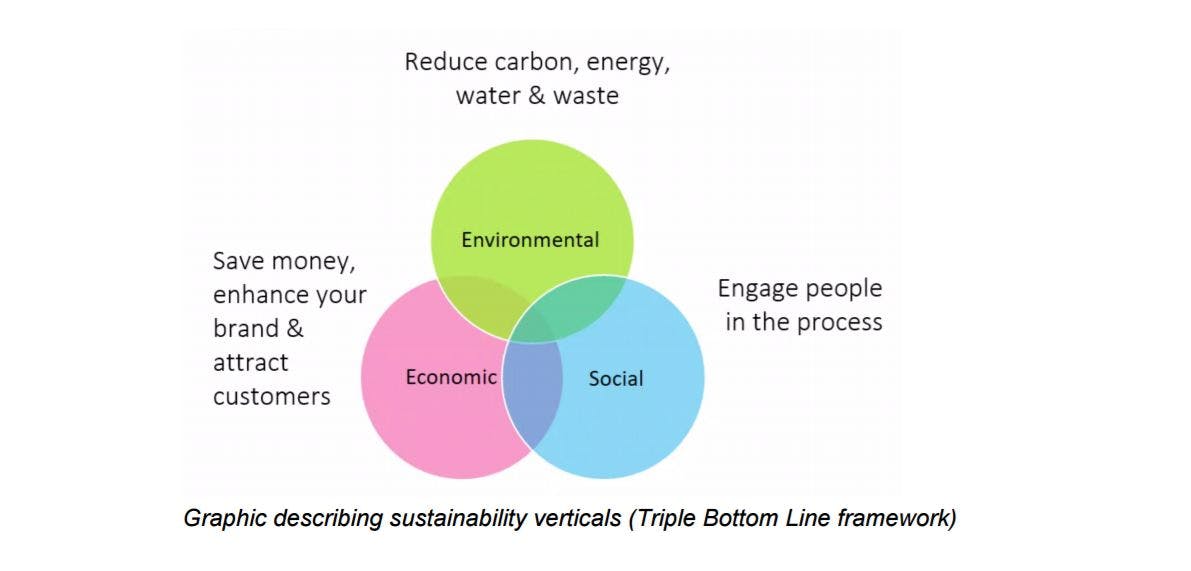As big corporations move forward with sustainability initiatives to save energy, improve efficiency and build sustainable supply chains, small and medium sized enterprises (SMEs) are following suit. They no longer dismiss sustainability as merely good intentions, but as a key business driver and strategic differentiator for brands.
Increasingly SMEs are trying to establish stronger standards surrounding their sustainability practices with many being keen to work with established sustainability certifications and accreditation bodies.
The challenge for SMEs, however, is that sustainability certifications for big corporations, such as those conducted by the Global Reporting Initiative (GRI) and the CDP, are expensive and complex relative to the scale of their business operations.
How can SMEs link sustainability to profit and leverage sustainability to better market their company?
Experts Steve Malkin from international sustainability certification programme, The Planet Mark™, and Tony Wines, Founder and CEO and Ian Catley, Director and Head of Business Development of Turnkey Group – A sustainability platform and services company — share their practical advices in this area.
What does it really mean for a company to be sustainable?
Steve Malkin (SM): In simple terms, sustainability defines the ability of systems to remain diverse and productive and self-sustain indefinitely. For a business, this means the capability to continue for an indefinite period, sustain itself in a rapidly changing world and market by balancing economic, social and environmental impact.
Sounds straight-forward but how can SMEs achieve it?
SM: For sustained, strong economic performance you have to consider the social and environmental impacts of your business. They are inter-dependent. Let’s consider the environmental aspect as a primary impact. Our aim here will be to reduce carbon, energy, water, waste.
You can achieve it by engaging your employees to start looking at resource efficiency and being better for the planet. By reducing your carbon footprint, you reduce costs.
By measuring results, you are getting evidence of your environmental and social performance that could be used to diferrentiate and attract customers. It is a virtuous circle – good for business, planet your employees and customers.

Ian Catley (IC): From an ethical perspective, by embedding sustainability initiatives into your business, you are are engaging your employees towards a common goal. This strenghtens your team, helps to retain and attract good employees and makes you more attractive to customers and investors.
We see many big brands integrating sustainability into their business strategy and branding. How can we make sustainability more accessible to SMEs?
IC: It is important for SMEs to understand sustainability, what it means to their business and what benefits it can bring and then embed it into their management strategy. There are many tools that can make implementation process easier and our solutions can help SMEs to cost effectively implement, manage, measure and report on sustainability.
Our collaboration with The Planet Mark™ is successful because we are aligned in terms of how we see sustainability. We both want to make it accessible to any size and type of organisations in the world and make it easier to achieve business benefits. We both want to drive it to the quickest ROI (return of investment) possible, in the most impactful way but without impacting on a business’s time, resources and cost.
SM: In addition, it is much easier and faster to embed sustainability into a SME than into a big brand. SMEs have simpler structures and can implement changes more rapidly. If you work with partners that can take ‘heavy lifting’ away, you can implement a sustainability policy and start managing and reporting your performance within couple of months.
As the implementation process is faster, the ROI and new business opportunities will also come faster.
What challenges might SMEs expect when implementing a sustainability strategy? How could you facilitate this?
Tony Wines (TW): The biggest concern of SMEs is usually cost and ROI. It is important to understand that whenever there is a reduction of carbon, there is a profit. Sustainability strategy should be a profit centre for the business. Measure your energy, water consumption, waste and carbon in terms of cost saving.
Use available tools to simplify the process and get accurate, verified results. It will help you to become a great supplier and win or retain business.
SM: Another big challenge is lack of resources and time. But you do not necessarily need a single sustainability specialist in a company, you could embed sustainability principles to current functions of your employees. People want to contribute to a better planet, environment and society.
They will volunteer to support and run sustainability programmes. Our companies can help to embed sustainability into your agenda and provide training to your staff if needed. Being engaged with the same goals leads to team building and strengthens the culture of the company. It is also important to include sustainability in the agenda of the board meetings, so it is known as a part of your business strategy.
How can an organisation use sustainability to improve its financial performance and drive marketing?
SM: We understand that financial benefit is usually the most important business driver for SMEs. We have already mentioned that a sustainability programme saves money through resource efficiencies – reduction of energy, water, waste consumption reduces carbon and costs.
As an example, companies certified by The Planet Mark™ on average save £100 per employee per annum and saved 5 per cent carbon per employee per annum. However, what’s even more important is that sustainability builds up your ability to win business. It is your chance to differentiate, become more competitive and be a more responsible supplier.
TW: Remember that to stand out in tenders and win a corporate or government project, you will need to provide evidence against your company sustainability performance using verified data. Having evidence of your sustainability performance is necessary to back up your marketing efforts and could be used as an indicator for your customers. Turnkey Group helps businesses to measure, manage and report on their sustainability performance including environmental and social impact.
SM: Most SMEs do not take the best out of sustainability to market their achievements. We created a brand that makes it easy to communicate at a glance. In order to make the best out of your sustainability strategy and generate new business flow, you need to fully engage your marketing team in the sustainability program.
Your marketing team should talk confidently about your sustainability targets and achievements and back it up with proven results.
IC: Sustainability initiatives will also help you to reduce cost of recruitment – people want to work for organisations that do the right thing. Sustainability helps attract and retain talented staff – reducing recruitment costs, supporting productivity and increasing innovation.
To summarise: to get on the top of your sustainability - quantify your impact, set your targets, prove it with verified results and share results with your customers and target audience. It will help you to retain and win more business.
How can a company react to demands from their trading partners and investors?
SM: Sustainability is being forced down the supply chain by the bigger brands. Suppliers are important partners that help bigger brands improve the efficiency of the processes and the sustainability profile of the products they sell.
Thus, big retailers and brands now insist on their supply chain partners having a sustainability policy in place. It is an opportunity for SMEs to implement a sustainability strategy, quantify its impact, and differentiate themselves from the competition to win business.
As a result of measuring and reporting your environmental and social impact, you will be seen as a ‘lower risk’ supplier.
TW: This is extremely important for your customers as well as investment partners. We have experience working with the Private Equity sector and can see increasing demands from their investment partners on sustainability reporting.
We have been supporting private equity portfolio businesses by measuring and reporting their sustainability KPIs. Investment partners consider it as an indicator of a well run business. It suggests that you are on the top of your operations.
By setting the target to reduce your carbon, you are actually looking at reducing operational costs and manage day to day business better. Lots of SMEs have never brought together their operational costs with a real view on reducing it or driving efficiency.
A carbon footprint helps companies to do that. I see that most of the information and suggestions that you have shared with us are based on your expertise in working with SMEs, MNC’s as well as financial institutions.
How would you describe in short the services / products you provide to help companies to become more sustainable?
IC: Turnkey Group provides a sustainability platform that makes it easy to collect, measure and report on sustainability data, so you have sustainability metrics that you can use for ESG reporting and communication with your customers and investors.
We are very experienced working with SMEs, suppliers and larger corporations that aim to achieve full transparency of sustainability performance in their supply chains.
SM: The Planet Mark™ helps companies to set carbon reduction targets, implement changes, engage people in the process which leads to obtaining our internationally recognised certification. We also help businesses to promote their sustainability achievements.


















